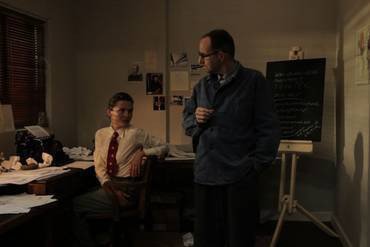Anja Kirschner and David Panos
dal 28/6/2011 al 8/10/2011
Segnalato da
28/6/2011
Anja Kirschner and David Panos
Staatsgalerie, Stuttgart
The artists present their 'Open Stores' selection in correspondence with their new film 'The Empty Plan'. The protagonist of the film is the German author, dramatist and director Bertolt Brecht. With a focus on his Hollywood period, the film explores Brecht's theoretical and practical theatre work and its changing historical conditions during the late years of the Weimar Republic and the period of exile in California, after his return to Germany and in the later German Democratic Republic.

Curated by Alice Koegel
In a series entitled »Open Stores«, the Staatsgalerie Stuttgart invites artists to work with its collection. The series takes its starting points from the works and areas of the collection held in the stores and archives of the museum – usually closed to the public – and from a discussion of the store itself as a place of conservation and categorisation.
The artists Anja Kirschner (b. 1977) and David Panos (b. 1971) from London will be presenting their »Open Stores« selection in correspondence with their new film »The Empty Plan«, which was produced with support from the Staatsgalerie Stuttgart. The protagonist of the film – to be premiered in Germany within this framework –is the German author, dramatist and director Bertolt Brecht. With a focus on his Hollywood period (1941–47), the film explores Brecht's theoretical and practical theatre work and its changing historical conditions during the late years of the Weimar Republic and the period of exile in California, after his return to Germany and in the later German Democratic Republic. A collage of contrasting stage improvisations, imaginary dialogues in film studio settings and documentary reconstructions, »The Empty Plan« raises fundamental questions concerning ideological content in various forms of artistic presentation, as well as the relationship between art and politics – aspects still relevant to current aesthetic-political debates.
In their selection of works primarily from the store of the Staatsgalerie Stuttgart's Department of Prints, Drawings and Photographs, Kirschner and Panos likewise explore the complex and ever-changing relationship between artistic forms and political movements in the critical period leading up to World War II. They base their deliberations on Brecht's criticism of the naturalistic and nationalist constructions of realism which gained popularity during the period in question and were also present in the exhibition programme of the Department of Prints, Drawings and Photographs. In his theoretical and practical work alike, Brecht defined realism – on the contrary – as a critical attitude towards the prevailing circumstances with regard to possibilities for collective change. The choice of works from the Staatsgalerie Stuttgart was carried out in dialogue with the art historian Kerstin Stakemeier, one of whose research fields is Realism.
»The Empty Plan« film production was funded by Arts Council England through Film London Artists' Moving Image Network, co-produced with City Projects and supported by Focal Point Gallery / Southend-on Sea , Staatsgalerie Stuttgart and Kunsthall Oslo.
Image: Anja Kirschner and David Panos, The Empty Plan, 2010, Film Still.
© Anja Kirschner and David Panos
Marketing/Communication
Dr. Beate Wolf Head of Department Tel. +49 (0)711 47040275 b.wolf@staatsgalerie.de
Staatsgalerie Stuttgart
Konrad-Adenauer-Str. 30-32, Stuttgart
Opening Hours: Wed, Fri, Sat + Sun: 10:00 am - 6:00 pm
Tues + Thurs: 10:00 am - 8:00 pm
Mon: closed



